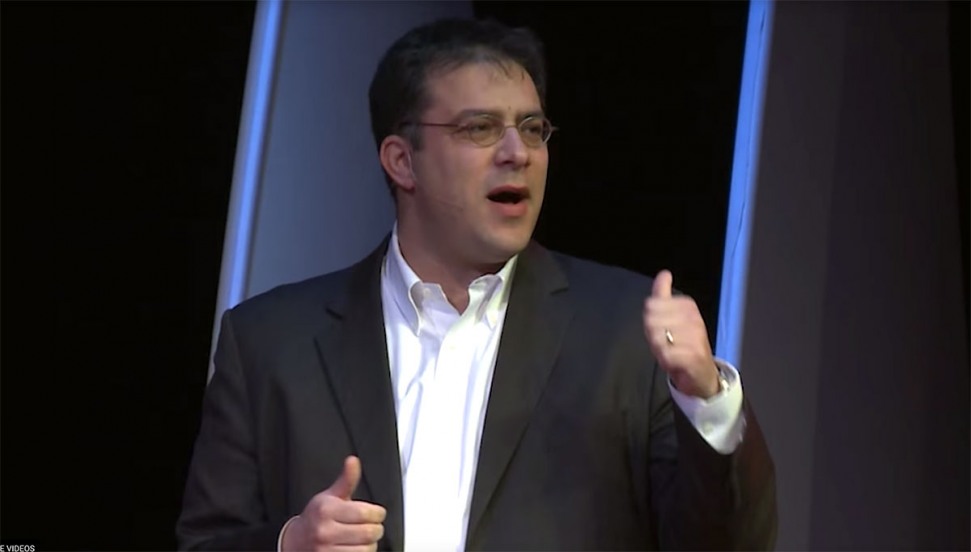PROVIDENCE, R.I. [Brown University] —Why have more and more Americans lost faith in government institutions? What is behind the tone and divisiveness of this election season? Is it money? Lobbyists? Could filibusters or gerrymandering be to blame?
Marc J. Dunkelman, a fellow in public policy at the A. Alfred Taubman Center for American Politics and Policy at Brown University, spent more than 12 years in Washington in roles ranging from Senate Judiciary Committee staff to senior fellow at the Clinton Foundation. He identifies an unexpected root cause of institutional gridlock: how ordinary Americans invest their time and attention.
In his 2014 book, “The Vanishing Neighbor: The Transformation of American Community” and in a TEDx Talk titled “Why You’re the Reason Washington’s Broken,” Dunkelman points to the loss of community-level relationships — with neighbors, local merchants, members of parent-teacher associations, for example — as a source of political polarization, partisanship and a lack of useful compromise in Washington.
What are community-level relationships, and how have they evolved of late?
Most of us maintain a wide array of relationships: They range from very intimate relationships with family members and close friends to transactional relationships with vendors at the local grocery store. In between are what I call “middle-ring” relationships — people with whom we have familiar, but not intimate ties. Relationships with people you’d know well enough to talk to about something more significant than the weather. Maybe someone’s mom is in poor health, and you would ask after her. Maybe someone’s son is struggling in math, and you would ask if he’d found a good tutor.
The core of my argument is that over the last several decades, we’ve taken a great bulk of our time and attention and transferred it away from the “middle-ring” relationships, choosing instead to invest in more and less intimate alternatives. We “FaceTime” with our children while on business trips instead of kibitzing at the hotel bar. We contribute comments to an online discussion about our favorite baseball team instead of spending the evening at the Elk’s Club.
Why do Americans have fewer middle-ground relationships now?
It’s some combination of motive and opportunity. We have many more options today when we’re choosing to invest our time and attention. My grandparents could never have connected with people around the world with such alacrity. Nor were they in touch with one another with the regularity we are with text messages and tweets and mobile phones and Skype.
>But more than that, most of us prefer to be in touch with people in the inner rings and the outer rings. Who doesn’t want to spend more time with their kids? Who doesn't want to interact more with the people who share their interests? It’s perfectly natural to want to invest your time and attention in inner-ring and outer-ring relationships — but there are ancillary costs to abandoning those in the middle.
In your TED Talk, you say that Americans no longer send representatives to Washington with instructions to negotiate compromises, like the one Newt Gingrich and Bill Clinton struck in 1997. What factors contribute to the lack of support for reasoned compromise?
In a political context, middle-ring relationships are particularly important — and their absence is profound. We’ve come to accept that partisanship in Washington has deepened because of some combination of money in politics, gerrymandering, lobbyists and filibustering. Those elements play a role, but none of them are new to the political scene. They all existed in moments when Washington worked at a more comfortable clip.
What has changed? Voters, who once gleaned a sense of why the other side approached societal problems through their middle-ring relationships, no longer have the benefit of that additional lens. It was through middle-ring relationships that progressives could come to understand why conservatives believed something different, and vice versa. It wasn’t that talking to someone about an issue over a beer or on the sidelines of a PTA meeting would change your own point of view. But understanding why someone takes the other view opens the door to compromise and collaboration.
In the absence of thick middle rings, we tend to demand that our leaders stand on partisan principle, and we see compromise as “selling out.” American democracy is premised on our ability to stomach collaboration across the chasms of disagreement. Middle-ring relationships have long been the touchstones of political compromise.
You have noted that the process of “deliberative polling,” in which a random sample of people gather and discuss issues at some length, can lead people who strongly disagree on a subject to achieve greater consensus. Given that most people won’t have that immersive experience, what do you think it would take to rebuild community-level strength?
The most important barrier to the resolution of any disagreement is the failure of either party to see the problem through the other’s eyes. Compromise depends on each respective side saying: “I may not agree, but I can see why you might think that.”
There’s no single bill that will re-enliven the middle rings in one fell swoop. We’re going to need to adapt the institutions of American government to the new realities of American community.
That said, the key to building middle-ring relationships centers around what a growing legion of scholars call “grit” or “non-cognitive” skills. How do you handle disagreement? Do you lash out? Do you turn away? Or are you able to withstand those impulses in the service of understanding other people’s perspectives? A movement is afoot in the world of education to imbue future generations with additional grit. If anything, that likely marks the most powerful tool we have to encourage Americans to re-engage.
